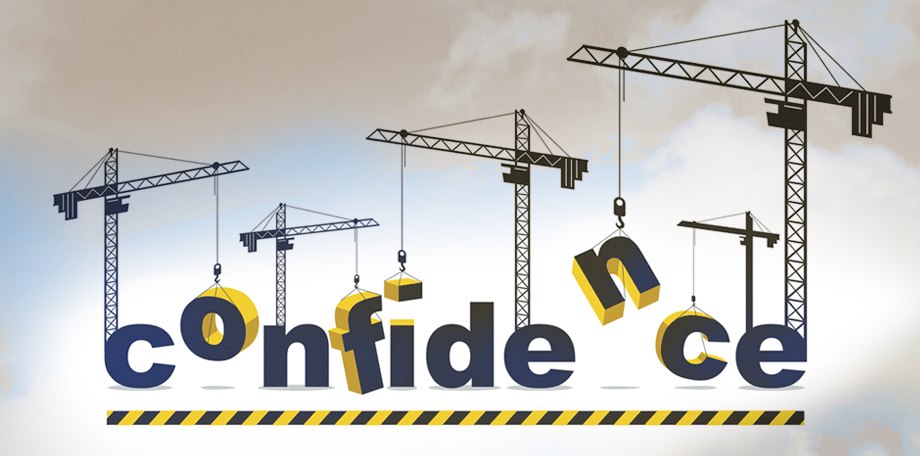SELF-CONFIDENCE IS LIKE A MAGNET. IT ATTRACTS NOT ONLY OTHER PEOPLE, BUT MYRIAD OPPORTUNITIES.
Job candidates who exude self-confidence are more likely to land the position. Self-confident leaders are more likely to get results. Even in the context of personal relationships, self-confidence helps people forge stronger, healthier connections.
What is self-confidence? At its core, self-confidence is a perception. With the potential to impact your thoughts, moods and behaviors in profound ways, it can be a powerful driver of success in all areas of your life. True confidence transcends what we do and what we know. When you base your self-confidence on who you are instead of what you accomplish, you’ve created something that no one can take away from you.
WHY SELF-CONFIDENCE MATTERS
Insecurity causes people to feel stuck — in unfulfilling jobs, unhealthy relationships and other unsatisfying situations — because they deem themselves incapable and powerless. To make matters worse, insecurity also feeds on itself, which is why it is imperative to break its cycle.
With origins from the Latin root confido, meaning “to trust,” the word self-confidence conveys trust in yourself. Accordingly, self-confident people are able to move forward, engaging in new experiences and taking on new challenges. Self-confidence perpetuates itself; the more capable you feel, the more you are willing to dip your toe into unfamiliar waters.
BARRIERS TO BUILDING SELF-CONFIDENCE
Like mastering other skills, learning how to be more self-confident takes patience, hard work and practice. Along the way, you may have to overcome one or more of the following obstacles:
- Inertia
- Fear
- Learned helplessness
- Unrealistic goals
- Blame
- Isolation
- Perfectionism
- Clutter
- Toxic relationships
There is, however, overriding good news: Everyone can learn how to build self-confidence.
10 Ways to Build Self-Confidence
Whether you are a seasoned professional or a recent college graduate, a competitive athlete or a first-timer at the local gym, you can take steps to increase your overall level of confidence. You’ll find that when you make an investment in your self-confidence, the dividends tend to spill over into all areas of your life.
Here are some excellent ways to start
1. Conquer a personal challenge: The fastest way to develop self-confidence is to do something you’ve never done before — or are afraid to try. Imagine taking a zip lining tour on your next vacation — despite your fear of heights. Participating in an activity that intimidates you helps build confidence not necessarily because you’ve done something, but because you tested your abilities and proved to yourself, “Hey, I really can do this!” That challenge doesn’t need to be as extreme as zip lining; successfully creating a new microhabit, such as putting aside $25 per paycheck for a holiday spending account or swapping processed foods for natural alternatives, can yield the same result.
2. Create powerful requests: People who lack confidence often mask their need for help. Most of us tend to feel uncomfortable making requests, concerned that it shows vulnerability and draws attention to our weaknesses. But the ability to clearly ask for help when you need or want it is actually a sign of strength. Successful individuals make powerful requests all the time. In fact, the more powerful a request you make, the more opportunities you will be able to create for yourself — personally and professionally.
True confidence transcends what we do and what we know. When you base your self-confidence on who you are instead of what you accomplish, you’ve created something that no one can take away from you.”
Practicing making requests is an effective strategy for increasing self-confidence. Try this: Identify a simple request you can make to someone who is likely to respond positively to it. Then, make a more robust request of someone else. Continue to build up the stakes until you are asking for something that puts you in a heightened physiological state: racing heart, and increased perspiration and respiration. It is important to remember that the other individual’s reaction to the request — whether you get a “yes” or a “no” — is immaterial. It is the process and practice of making powerful requests that will help you create a foundation for self-confidence.
3. Say “yes” — or “no”: Leaving your comfort zone fosters new experiences, encourages new conversations and forges new neuropathways. Go ahead and accept an invitation to a party where you may not know anyone but the host, or agree to chair a volunteer committee in your neighborhood.
If, however, you tend to be a people pleaser, practicing the ability to say “no” to situations in which you would normally say “yes” can achieve the same benefit. Even though this exercise might be extremely uncomfortable — and very difficult to do — do it anyway! Practice saying ‘no’ when you would say ‘yes’ at least once a week and you will build a more expansive repertoire of responses, grow your confidence and increase self-awareness around your automatic, underlying operating system that keeps you stuck in your comfort zone.
4. Stop blaming: When you point the finger at others — or even more so, when you habitually blame yourself — when something doesn’t go as planned, you assign judgment, shifting focus away from the task or situation. Instead, try to take a more objective perspective, evaluating the facts so that you can consider alternative actions the next time you face similar circumstances. By eliminating blame, you empower yourself to find solutions. Over time, this ability will significantly enhance your self-confidence.
5. Relinquish control: You hold the reins when it comes to your moods, thoughts, perspectives and actions. On the other hand, you cannot control other people, events and many circumstances. Developing spiritual confidence can help you find peace and comfort in learning to let go of those things beyond your control.
People often feel the need to control because they don’t trust that things will work out the way they want. That mistrust is immobilizing, and can prevent you from taking action. If you harbor concerns about your ability to find a new job because you believe that no one will hire you, you might put off writing your resume, updating your LinkedIn profile and starting your job search. Lacking trust in a positive outcome can prevent you from being able to “go with the flow;” by resisting, you might create unnecessary pain and drama.
If you have perfectionistic tendencies, you might suffer from “analysis paralysis” because you want everything to be precisely and predictably on target before moving forward. For you, letting go of control will be an even greater challenge — and, perhaps, a sweeter victory when you conquer it.
6. Use powerful language: Whether you’re talking to yourself or to others, choose words that convey strength and a “can-do” attitude. The ability to push through obstacles stems from the language we use to communicate with ourselves and others. Remember being instructed to “use your words” back in kindergarten or preschool? As an adult, you can choose words wisely to convey — and, more importantly, build — confidence.
Here are a few examples:
- Use declarative verbs to state your intentions. Instead of saying “I could reach my sales goal by the end of the month,” say, “I will reach my sales goal by the end of the month.”
- Rather than asking yourself, “Why can’t I …?,” ask “How can I …?”
- Eliminate minimizing words (just or feel) that weaken your statements. (“The situation is getting out of hand” is a more confident statement than “I just think that the situation is getting out of hand.”)
- Avoid adding rhetorical questions at the end of a sentence: “We need to cut our spending,” is stronger than “We need to cut our spending, don’t you think?”
- Whether in public speaking situations, interviews or even one-on-one conversations, pause while collecting your thoughts rather than using fillers (umm, uh, ah, etc.).
Keep in mind that your language isn’t limited to words. In fact, you communicate on a somatic level — through your facial expressions, hand gestures, posture and tone of voice — every day. Amy Cuddy, author of Presence: Bringing Your Boldest Self to Your Biggest Challenges, explains that you can gain self-confidence by making adjustments to — and repeatedly practicing — your posture, stance and gait.
7. Eliminate clutter: Chaos and disorder weigh you down, and drain you of the positive energy necessary to move forward. While taking control of your environment begins as a literal activity — organizing your workspace or cleaning out a closet, for example — it will evolve into a metaphor for your ability to manage yourself, your career and your life. The process of eliminating clutter requires you to make countless small but potent decisions that will empower you with momentum that will carry over to other areas of your life.
8. Take action: Inertia breeds low self-confidence; and low self-confidence breeds a feeling of powerlessness to conquer inertia. Thus, you tend to feel — and remain — stuck, whether in an unfulfilling job, an unhealthy relationship or any other type of unsatisfying situation or condition. Breaking the vicious cycle is as easy as taking one small step toward change.
Procrastinating is a self-defeating behavior caused by an underlying doubt in your efficacy. Often mislabeled as “laziness,” putting things off actually stems from this distrust. When you take action, you deflate that inner skeptic, which, in turn, improves your self-confidence.
9. Be accountable: Accountability means doing what you said you would do, when you said you would do it — even if it’s a promise you made to yourself. In this sphere, there are no shortcuts. Aiming for impeccability in honoring commitments and delivering on promises will turbo-charge your self-confidence and dramatically improve results in your personal and professional life.
Note: Our Accountability Mirror™ and MindMastery™ workshops incorporate proven strategies to train you to better manage your thoughts and moods in order to achieve true accountability, communicate more effectively, improve your performance and attain sustainable long-term results.
10. Acknowledge growth: Along the road to increased self-confidence, stop and notice your triumphs, however big or small. When you base your confidence on the person you’ve become, you learn to appreciate your unique gifts and qualities. Own them, rather than comparing yourself to your neighbor, co-worker or sibling. Over time, this continued practice of authenticity will take root — and blossom into bona fide self-confidence.



